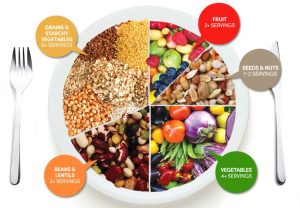Hair Transplant Nutrition Recommendations: Hair transplant is a significant aesthetic procedure that can have a profound impact on both your appearance and confidence. However, the success of the procedure and the healing process can be greatly influenced by various factors, including nutrition. Proper nutrition before and after a hair transplant can enhance the success of the procedure, promote faster healing, and support the health of the hair follicles. In this article, we’ll explore key nutritional recommendations to help optimize your hair transplant results.

Pre-Hair Transplant Nutrition Recommendations
Before undergoing a hair transplant, your body needs to be in the best possible condition for healing and the procedure itself. Eating the right foods can promote healthy hair growth and minimize complications during surgery. Below are key dietary recommendations to follow before your hair transplant:
1. Sufficient Protein Intake
Hair is primarily composed of keratin, a protein, so it’s essential to consume enough protein before your hair transplant. Adequate protein intake supports hair health, strengthens hair follicles, and ensures the successful growth of transplanted hair. Include foods like chicken, fish, eggs, yogurt, and legumes in your diet to provide your body with the protein it needs.
2. Iron and Zinc Supplements
Iron deficiency is one of the leading causes of hair loss. Iron is essential for the healthy function of hair follicles and can help prevent further hair shedding. Iron-rich foods include spinach, red meat, lentils, and shellfish. Zinc, another important mineral for hair growth, can be found in foods like eggs, nuts, seeds, and seafood. Ensuring adequate levels of iron and zinc will support both the success of your hair transplant and the overall health of your hair.
3. Omega-3 Fatty Acids
Omega-3 fatty acids are crucial for maintaining healthy hair. They help nourish hair follicles and improve scalp health, which is essential for hair growth. Foods rich in omega-3s, such as salmon, sardines, walnuts, and flaxseeds, should be included in your diet to enhance the quality of your hair and promote healthy hair growth.
4. Vitamin C
Vitamin C is essential for collagen production, a protein that helps maintain the structure and integrity of the skin and hair. Additionally, vitamin C aids in the absorption of iron, which is vital for healthy hair growth. Citrus fruits, strawberries, bell peppers, and broccoli are excellent sources of vitamin C and can support the health of your hair before the transplant.
Post-Hair Transplant Nutrition Recommendations
After your hair transplant procedure, proper nutrition becomes even more critical to support healing and ensure the optimal growth of your newly transplanted hair. Below are some important nutrition tips to follow after your hair transplant:
1. Anti-Inflammatory Foods
After the procedure, you may experience some swelling, discomfort, or inflammation. Consuming anti-inflammatory foods can help reduce these symptoms and accelerate the healing process. Olive oil, green tea, avocados, and blueberries are excellent choices for reducing inflammation and supporting the recovery process.
2. Hydration is Key
Drinking plenty of water is essential for post-transplant healing. Staying hydrated ensures that your body can heal properly and that the hair follicles receive the nutrients they need to grow. Aim to drink at least 8-10 glasses of water per day to promote faster recovery and maintain scalp health.
3. Vitamin and Mineral Supplements
In the post-transplant phase, taking additional vitamins and minerals can be beneficial. B vitamins, vitamin A, and zinc are all important for healthy hair growth and can help speed up the recovery process. These nutrients can promote the healthy growth of your transplanted hair and keep your scalp in optimal condition. Consult your doctor to determine if supplements are necessary for you.
4. Avoid Processed Foods and Sugar
While you may be tempted to indulge in comfort foods after the procedure, it’s important to avoid processed foods and excessive sugar consumption. These can contribute to inflammation, delay healing, and even affect the health of your hair follicles. Focus on whole, nutrient-dense foods to ensure a smooth recovery.
Conclusion
Proper nutrition plays a pivotal role in the success of your hair transplant, both before and after the procedure. A diet rich in protein, iron, zinc, omega-3 fatty acids, and vitamin C before the transplant will help support healthy hair growth and ensure a smoother procedure. Post-transplant, anti-inflammatory foods, hydration, and vitamin supplements can accelerate recovery and promote the healthy growth of transplanted hair. Remember that every individual’s needs are different, so it’s best to consult with your hair transplant specialist or nutritionist to tailor a personalized nutrition plan for the best results.
